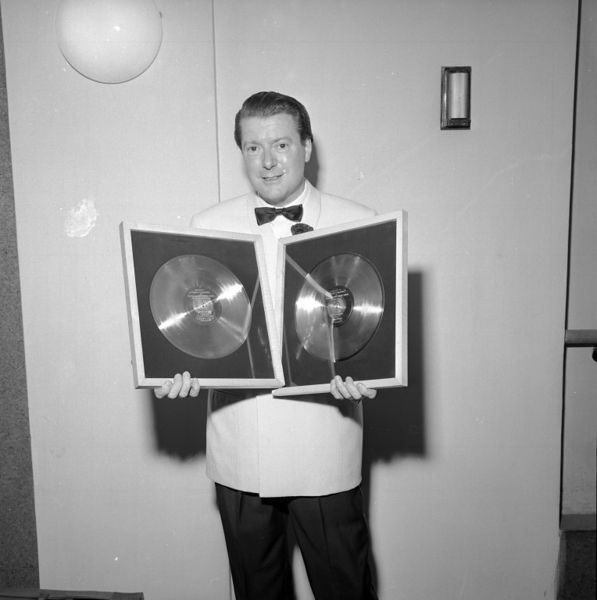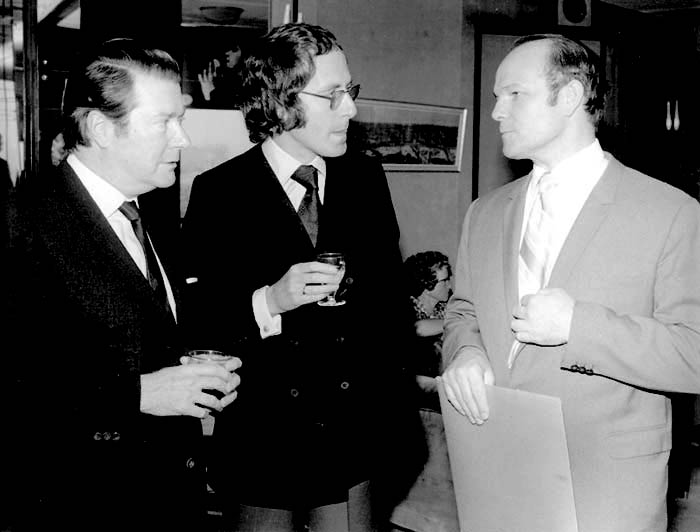Frank Chacksfield

Frank Chacksfield is still remembered by many music lovers and record collectors for his numerous albums and appearances on radio and television during the era following the second world war.
From the 1950s onwards, Chacksfield was one of Britain's most famous orchestra leaders, and his fame spread far beyond our shores. Early in his career he was fortunate to have several big sellers in the USA, which firmly established his reputation world-wide.
He was born Francis Charles Chacksfield in Battle, Sussex, on 9 May 1914; he died on 9 June 1995 aged 81 in Kent, having suffered for several years from Parkinson's Disease. During his long recording career with Decca alone, it is estimated that his albums sold more than 20 million copies. In total he made more than 150 long-playing albums which were released in many countries, especially in Europe, Japan and Australia as well as Britain and America.
As a boy, he started piano lessons at the age of seven, and also learned the organ, passing the Trinity College examinations. He took a particular interest in the theory of music, appearing at Hastings Music Festivals by the time he was 14. A year later he became deputy church organist at Salehurst Parish Church near Robertsbridge, Sussex, and formed his first dance band. His parents were against a musical career, so Frank went to work in a solicitor's office. Finding the law boring, he decided that his future would have to be in music, and he formed a band in 1936 which held a resident engagement at Hilden Manor Road House at Tonbridge, Kent for three years. In 1939 a summer season at Jersey was terminated upon the outbreak of World War 2, and Frank volunteered for the Army.
He was about to be sent overseas with the Royal Signals when he was taken ill. While convalescing, he made his first broadcast from the BBC's Glasgow Studios, singing 'original songs at the piano'.
He was posted to the Royal Army Service Corp's Southern Command Entertainment's Section at Salisbury, Wiltshire, and later became staff arranger for "Stars In Battledress" at the War Office in London under George Black, with the rank of corporal. He shared an office with Sergeant Charlie Chester, who had already established a pre-war career as a comedian. They were both demobbed on the same day, leading to a job with the stage version of Chester's popular radio show "Stand Easy" at Blackpool, with Frank conducting the orchestra.
He soon became involved with various BBC Radio shows as arranger, composer and conductor, including Jon Pertwee's "Puffney's Post Office", the "Frankie Howerd Show" and "Up The Pole" staring Jimmy Jewel and Ben Warris. From 1948 onwards his name started appearing on 78s backing various singers, and for a while he also worked as musical director of the Henry Hall and Geraldo orchestras.
The first Frank Chacksfield singles in his own right were released in 1951 with several sides for Polygon, Columbia, Parlophone and Oriole. Some were labelled 'Singing Strings', with others called 'Frank Chacksfield's Tunesmiths'. In 1953 he formed a 40-piece orchestra with a large string section. His very first 78 recorded for Decca in April - Charlie Chaplin's themes for his film "Limelight" - won him a Gold Disc through its big success in the USA. In Britain it earned him the New Musical Express Record of the Year award. His second 78 "Ebb Tide" became the first-ever British non-vocal disc to reach No. 1 in the American charts, providing a second Gold Disc. American juke-box operators, in a nation-wide poll, voted Chacksfield the most promising new orchestra of the year. Following his great success with his Decca recordings, in August 1954 the BBC invited Frank Chacksfield to present his orchestra on television, and these shows continued, on and off, until 1964 when he conducted several half-hour programmes in the "Best of Both Worlds" series on the newly-launched BBC-2 channel, which were sold to some other countries. He also became an almost permanent fixture on BBC Radio in "Limelight", "Melody Hour" etc. As a child he had suffered from a slight stutter, but the friendly manner in which he conquered this affliction somehow added to his charm when he introduced his own programmes.
Chacksfield was also a very good composer with a large number of titles to his credit, sometimes using pseudonyms such as Martino Paticano and Roger Senicourt. Among his better-known pieces are: "Firecracker", "Cuban Boy", "Candid Snap", "Summer Serenade", "Innishannon Serenade", "Bossa For Bess", "Autumn Island", "Rosella", "Medway Magic" (commissioned by the BBC), "Hop Scotch Hop", "Blue Train" and many more.
Radio and television commitments frequently found him in Eire during the 1960s and 1970s. In 1965/66 he co-hosted a series with French conductor Roger Roger, each playing their own (and other artists') discs. During 1972 Frank took a 40-piece orchestra to Japan, performing no less than 15 shows in 12 cities in 16 days - in addition to a television recording and two radio shows.
Over the years he was a popular guest on radio and television in the USA, and demands for personal appearances came in from all corners of the globe. Hundreds of concerts were played to enthusiastic and receptive audiences, which kept him in the front rank of the 'easy listening' conductors.
But it was his steady flow of long-playing records which ensured Chacksfield's continuing popularity and high public profile. Some of his best remembered include: "Evening in Paris", "Music of Noel Coward", "Evening in Rome", "Broadway Melody", "Mediterranean Moonlight", "Lovely Lady", "South Sea Island Magic", "In the Mystic East", "Film Festival" and collections of Academy Award-winning songs.
In his later years he became an astute businessman, with various interests in publishing and companies supplying 'canned' music. In response to current prevailing economic conditions, and changes in public tastes, he gradually moved on to smaller ensembles often playing music more rhythmic in nature, but always displaying the good taste that had become his trademark.
David Ades (August 2003)



